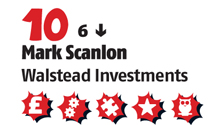 Why Scanlon is chairman of Walstead Investments, the owner of Wyndeham Group. This year hasn’t exactly gone to plan, with Wyndeham losing its single-biggest customer to Polestar. But ever the deal-maker Scanlon regrouped, moved on and was soon scoping out the potential takeover of stricken Global MP. While that proved unviable, Walstead did buy most of Global’s kit and Wyndeham is entering the short-grain market as a result. Scanlon has a quite phenomenal network and always seems to be in the know. “He’s very sharp and doesn’t miss anything,” says one associate.
Why Scanlon is chairman of Walstead Investments, the owner of Wyndeham Group. This year hasn’t exactly gone to plan, with Wyndeham losing its single-biggest customer to Polestar. But ever the deal-maker Scanlon regrouped, moved on and was soon scoping out the potential takeover of stricken Global MP. While that proved unviable, Walstead did buy most of Global’s kit and Wyndeham is entering the short-grain market as a result. Scanlon has a quite phenomenal network and always seems to be in the know. “He’s very sharp and doesn’t miss anything,” says one associate.
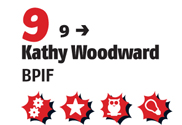 Why While it may seem odd for the Fed’s late chief executive to be included, it’s worth remembering that the Power 100 reflects the influence an individual has had on the industry in the past 12 months as well as their potential future impact. Based on past achievements, few would deny Woodward a place. Her desire to make print fit for the future by focusing on its most important asset, its people, will be her legacy. While her work was incomplete, she ensured that solid foundations were laid, and with her flagship scheme, the Graduate Management Programme, her impact will be felt for many years.
Why While it may seem odd for the Fed’s late chief executive to be included, it’s worth remembering that the Power 100 reflects the influence an individual has had on the industry in the past 12 months as well as their potential future impact. Based on past achievements, few would deny Woodward a place. Her desire to make print fit for the future by focusing on its most important asset, its people, will be her legacy. While her work was incomplete, she ensured that solid foundations were laid, and with her flagship scheme, the Graduate Management Programme, her impact will be felt for many years.
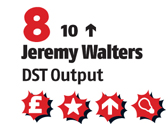 Why When Walters took the helm of DST Output as chief executive in January 2013, the business was coming to the end of a choppy period of ownership changes and site consolidation. So his biggest challenge was to steady the ship and he seems to be on course. The £160m business had returned to operational profit by the end of 2013. In the first half of 2014, it has built on that in terms of sales and profits. Described as “inspirational” by colleagues, after completing the London Marathon this year, his next goal is to develop a unified customer-centric ethos across the UK operations.
Why When Walters took the helm of DST Output as chief executive in January 2013, the business was coming to the end of a choppy period of ownership changes and site consolidation. So his biggest challenge was to steady the ship and he seems to be on course. The £160m business had returned to operational profit by the end of 2013. In the first half of 2014, it has built on that in terms of sales and profits. Described as “inspirational” by colleagues, after completing the London Marathon this year, his next goal is to develop a unified customer-centric ethos across the UK operations.
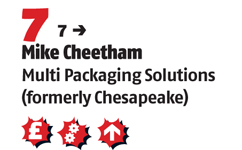 Why It’s been a big year for the print packaging company Cheetham has served for 19 years. In February, it completed a merger with New York-based Multi Packaging Solutions and in June the Chesapeake brand name was no more. Cheetham now finds himself president of a packaging powerhouse with 7,000 employees working on over 50 sites on three continents. An engineer by training, he got into print after stints in the aerospace, steel and automotive industries. It is in art that he finds solace in his rare quiet moments: he is a keen landscape photographer.
Why It’s been a big year for the print packaging company Cheetham has served for 19 years. In February, it completed a merger with New York-based Multi Packaging Solutions and in June the Chesapeake brand name was no more. Cheetham now finds himself president of a packaging powerhouse with 7,000 employees working on over 50 sites on three continents. An engineer by training, he got into print after stints in the aerospace, steel and automotive industries. It is in art that he finds solace in his rare quiet moments: he is a keen landscape photographer.
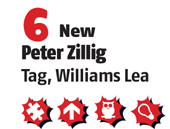 Why Zillig’s ascent to the Power 100 caps a period of flux at the world’s largest print management company, which has included the departure of three Power 100 members in former Williams Lea chief executive Tim Griffiths, Tag-founder Steve Parish and most recently the combined group’s print and procurement supremo Steve Nunn. Zillig was brought in as chief executive of Tag EMEA at the start of 2013, following Parish’s exit and is focused on expanding its continental Europe sourcing operations, including winning new clients and widening the geographic scope of activities with a number of existing clients.
Why Zillig’s ascent to the Power 100 caps a period of flux at the world’s largest print management company, which has included the departure of three Power 100 members in former Williams Lea chief executive Tim Griffiths, Tag-founder Steve Parish and most recently the combined group’s print and procurement supremo Steve Nunn. Zillig was brought in as chief executive of Tag EMEA at the start of 2013, following Parish’s exit and is focused on expanding its continental Europe sourcing operations, including winning new clients and widening the geographic scope of activities with a number of existing clients.
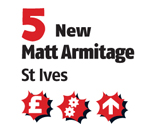 Why Stepping into the shoes vacated by Patrick Martell is former chief financial officer Armitage, who’s been with the group since 2007. This straight-talking Yorkshireman is more than a bean-counter, though and his background includes a spell in shampoo sales during his decade spent at FMCG giant Unilever. It’s too soon to say what sort of stamp he’ll make on St Ives, but colleagues say he is “incredibly bright”, “considered” and with a sharp sense of humour. Keen on cycling and keeping fit when not busy targeting the PLC’s next acquisition, we reckon he was glued to Le Grand Depart in the summer.
Why Stepping into the shoes vacated by Patrick Martell is former chief financial officer Armitage, who’s been with the group since 2007. This straight-talking Yorkshireman is more than a bean-counter, though and his background includes a spell in shampoo sales during his decade spent at FMCG giant Unilever. It’s too soon to say what sort of stamp he’ll make on St Ives, but colleagues say he is “incredibly bright”, “considered” and with a sharp sense of humour. Keen on cycling and keeping fit when not busy targeting the PLC’s next acquisition, we reckon he was glued to Le Grand Depart in the summer.
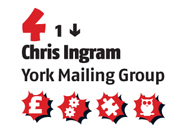 Why Another busy year for York’s chief executive, who has been honing the offering of the enlarged group, most recently with the purchase of Go Direct Marketing to create a data analytics wing. “Chris has done a superb job of identifying what is required,” says a colleague. With group turnover now topping £100m, Ingram says he remains open to “larger opportunities” for the business, and this necessitates hanging out with the finance community. “Because of the size of the operation and where we’re taking it I do spend more time talking to private equity houses about the future,” he says.
Why Another busy year for York’s chief executive, who has been honing the offering of the enlarged group, most recently with the purchase of Go Direct Marketing to create a data analytics wing. “Chris has done a superb job of identifying what is required,” says a colleague. With group turnover now topping £100m, Ingram says he remains open to “larger opportunities” for the business, and this necessitates hanging out with the finance community. “Because of the size of the operation and where we’re taking it I do spend more time talking to private equity houses about the future,” he says.
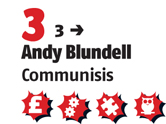 Why Few people have been busier in 2014 then Communisis chief executive Blundell. In addition to sealing the acquisition of video and film specialists Jacaranda and Public Creative earlier this year, he also clinched a deal for creative agency The Communications Agency as part of the company’s ongoing strategy to enhance the range of services it offers clients. But that’s not the only thing that’s been keeping Blundell busy. He’s also helped to secure significant long-term BPO contracts with the likes of Lloyds Banking Group and FMCG behemoth Procter & Gamble. Plus the company has splashed the cash on three more HP T-series inkjet presses, which it claims makes it the biggest transactional printer in Europe. Despite posting impressive sales growth of 18% for the year ended 31 December 2013 Blundell hasn’t had everything his own way. In May this year, the firm announced plans to reduce the headcount at its Cross Gates facility in Leeds due to declining direct mail volumes. It would have come as a personal body blow to Blundell who colleagues describe as driven, very committed and clear thinking, but respectful of the views of others. He’s also “passionate about client service and closely involved with senior client relationships,” which might help explain why the company has been so successful at hooking blue chip clients into long-term contracts. Those who know him best say that Blundell is fair minded, “reasonably easy” to work alongside and has a good sense of humour – “especially with those who are like-minded, early-birds and emotionally resilient!” says a colleague. Away from the cut and thrust world of BPO he likes to spend time with his family and enjoys participating in country pursuits around his second home on Mull.
Why Few people have been busier in 2014 then Communisis chief executive Blundell. In addition to sealing the acquisition of video and film specialists Jacaranda and Public Creative earlier this year, he also clinched a deal for creative agency The Communications Agency as part of the company’s ongoing strategy to enhance the range of services it offers clients. But that’s not the only thing that’s been keeping Blundell busy. He’s also helped to secure significant long-term BPO contracts with the likes of Lloyds Banking Group and FMCG behemoth Procter & Gamble. Plus the company has splashed the cash on three more HP T-series inkjet presses, which it claims makes it the biggest transactional printer in Europe. Despite posting impressive sales growth of 18% for the year ended 31 December 2013 Blundell hasn’t had everything his own way. In May this year, the firm announced plans to reduce the headcount at its Cross Gates facility in Leeds due to declining direct mail volumes. It would have come as a personal body blow to Blundell who colleagues describe as driven, very committed and clear thinking, but respectful of the views of others. He’s also “passionate about client service and closely involved with senior client relationships,” which might help explain why the company has been so successful at hooking blue chip clients into long-term contracts. Those who know him best say that Blundell is fair minded, “reasonably easy” to work alongside and has a good sense of humour – “especially with those who are like-minded, early-birds and emotionally resilient!” says a colleague. Away from the cut and thrust world of BPO he likes to spend time with his family and enjoys participating in country pursuits around his second home on Mull.
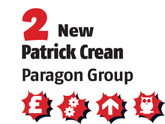 Why Paragon Group’s chief executive and major shareholder is either “an enigmatic character” or “a rottweiler” depending upon whom you talk to. Whether you warm to Crean’s style or not, he certainly achieves a great deal, and is described by one associate as “a grossly underestimated mover and shaker in this industry.” Long-term business partner and corporate finance expert Conor Donnelly has recently taken on the role of non-executive chairman at the group, and is no longer a director, so there’s a change in the dynamic duo that built Paragon Group into a pan-European powerhouse. Donnelly’s decision to step back results in Crean’s debut appearance in the Power 100, and recent happenings at Paragon puts him near the top of the list.
Why Paragon Group’s chief executive and major shareholder is either “an enigmatic character” or “a rottweiler” depending upon whom you talk to. Whether you warm to Crean’s style or not, he certainly achieves a great deal, and is described by one associate as “a grossly underestimated mover and shaker in this industry.” Long-term business partner and corporate finance expert Conor Donnelly has recently taken on the role of non-executive chairman at the group, and is no longer a director, so there’s a change in the dynamic duo that built Paragon Group into a pan-European powerhouse. Donnelly’s decision to step back results in Crean’s debut appearance in the Power 100, and recent happenings at Paragon puts him near the top of the list.
Like another of print’s power players, Mark Scanlon, Crean cut his teeth at the acquisitive Adare Group in the 1990s. And at Paragon Crean has put that acquisition know-how to good use, making a specialty in taking over failed businesses and consolidating them into something rather more successful, as the results at the circa £160m group business attest. A fan of his achievements says: “Paddy has been responsible for salvaging many of the inherently indifferently run print businesses and turned them into survivors first and winners second. His energy and commitment to his business stands him head and shoulders above most other players.” The most recent success was a deal to buy Service Point out of administration after events at that group’s Spanish parent caused the business to become unviable. The buy takes Paragon into an entirely new area due to Service Point’s branch network, and potentially adds some £40m of sales to the group. While a high-profile recruitment drive for the ‘new’ Service Point took place over the summer, Crean himself shuns the limelight and is both publicity- and camera-shy. No official photo is available, and he doesn’t even have a picture on his LinkedIn profile.
< < Entries 20-11 | Number 1>>
Attributes key









